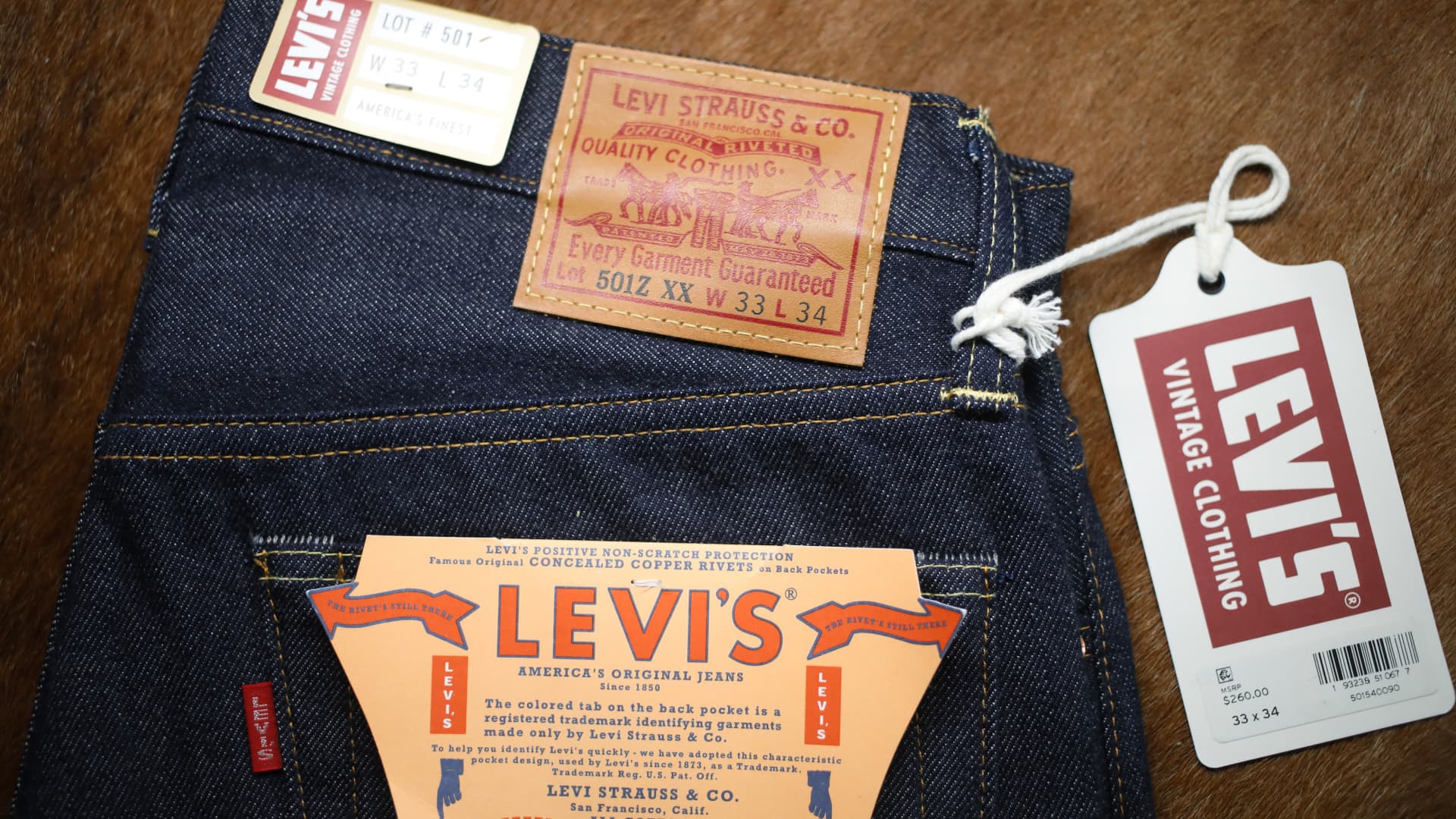
Levi Strauss on Thursday drastically cut its profit outlook for the year after the apparel retailer reported a steep drop off in wholesale revenues and soft sales in the U.S., its largest market.
The blue jean seller saw bright spots, however, in its direct-to-consumer sales and China market.
Shares dropped more than 6% in extended trading.
Here’s how the company did in its fiscal second quarter compared with what Wall Street was anticipating, based on a survey of analysts by Refinitiv:
- Earnings per share: 4 cents, adjusted, vs. 3 cents expected
- Revenue: $1.34 billion vs. $1.34 billion expected
The company’s reported net loss for the three-month period that ended May 28 was $1.6 million, or 0 cents per share, compared with a net income $49.7 million, or 12 cents a share, a year earlier. During the quarter, Levi reported adjusted earnings of 4 cents per share.
Sales dropped to $1.34 billion, down 9% from $1.47 billion a year earlier.
Halfway through its fiscal year, Levi slashed its full-year profit outlook. It now expects adjusted earnings per share of $1.10 to $1.20, compared to a previous range of $1.30 to $1.40. Analysts had expected adjusted earnings of $1.29 per share, according to Refinitiv.
Levi also tightened its revenue outlook for the year. The retailer now expects sales to grow between 1.5% to 2.5% compared to a prior range of 1.5% to 3%. Analysts had expected growth of 2.6%, according to Refinitiv.
The dismal outlook was attributed to a number of factors but was driven by an expected slowdown in U.S. wholesale revenues, which plunged 22% in the quarter, Levi’s chief financial and growth officer Harmit Singh told CNBC.
Wholesale revenue has fallen because of a consumer slowdown impacting the retail industry at large and internal issues at Levi that resulted in items being out of stock, said CEO Chip Bergh.
Bergh noted the company has grappled with high inventory levels, which created congestion at its distribution centers and made it harder to fill orders for wholesale partners.
“Now our inventory levels are improving significantly, that is improving our customer fill rates, which is improving our in stock position,” he said.
“We’re now partway into Q3 already, we are seeing our US wholesale sell out trends improve and a lot of that is simply due to the fact that we have better in-stock position today,” Bergh added.
The company is also planning on taking price reductions on about a half dozen of its more price sensitive items, such as its 502 and 512 jeans, moves that will cut into its margins in the quarters ahead. The jeans will drop in price from $79.50 to $69.50 but are still higher than their pre-pandemic price of $59.50, Bergh said.
He said the company raised prices relative to competitors past the point where it could continue to grow market share, “so we’re just narrowing that price gap versus competition back to the historical levels with this $10 rollback.”
Bergh noted the price reduction will only show at stores where Levi has wholesale partnerships, such as Macy’s, and won’t be seen at its owned stores or internationally.
Levi is also planning for a higher tax rate in the second half of the year, a trend it said contributed to the lower outlook. Levi’s effective tax rate during the quarter was 78.4%, compared to 36.1% in the year-ago period.
“Our outlook on U.S. wholesale, even with the pricing moves that we’re taking and everything else, we’re being cautious about it,” said Bergh. “Just in light of the recent performance, and the current macro headwinds, and just the consumer dynamics in this market.”
While the steep drop in wholesale revenue is hurting Levi in the short term, shifting sales away from wholesalers is part of the company’s larger strategy, said Bergh. The push is similar to Nike’s playbook.
“Our focus is to drive our direct-to-consumer business, including e-commerce, so our own stores, our franchise partner stores, which actually rolls up through wholesale globally, and our e-commerce business. That is our strategic priority,” said Bergh.
“It has better structural financials, higher gross margin, we’re in control of the consumer experience,” he said.
During the quarter, DTC revenues increased 13% and were driven by growth in both company-operated stores and online sales. E-commerce revenue increased 20% in the quarter.
When Bergh first joined Levi about 12 years ago, wholesale customers such as Macy’s and Kohls, accounted for more than 40% of Levi’s total business, but these days, it’s less than 30%, he said.
The slowdown in wholesale revenue contributed to a 22% sales drop in the Americas, where Levi saw $609 million in revenue, below estimates of $639.5 million, according to StreetAccount. Sales fell 2% in Europe, where the company reported $361 million in revenue, but they were higher than the $344 million analysts had expected, according to StreetAccount.
Sales were rosier in Asia, where revenue was up 18% in the quarter at $262 million, driven by strength in the company’s DTC channel. It beat Wall Street’s estimate of $230.2 million, according to StreetAccount.
Read the company’s full earnings release here.







